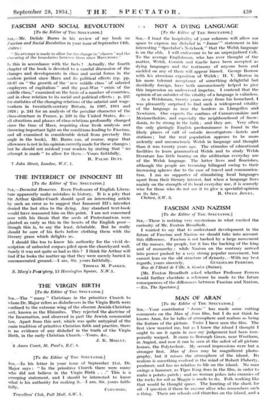FASCISM AND SOCIAL REVOLUTION
[To the Editor of TILE SPECTATOR.] Stn,—Mr. Delisle Burns in his review of my book on Fascism and Social Revolution in your issue of September 14th, states :
" No attempt is made to allow for the change in ' classes ' and the obscuring of the boundaries between them since Marx wrote."
Is this in accordance with the facts ? Actually, the fourth chapter of the book is devoted to a careful discussion of the changes and developments in class and social forms in the modern period since Marx and its political effects (cp. pp. 83-87 on " the growth of the ' new middle class ' of salaried employees of capitalism " and the post-War " crisis of the middle class," examined on the basis of a number of countries, and in close relation to its social and political effects ; p. 237 for statistics of the changing relations of the salariat and wage- workers in twentieth-century Britain, in 1907, 1911 and 1924 ; p. 241 for an analysis of the peculiar character of the class-structure in France, p. 239 in the United States, &c.— all situations and phases of class-relations profoundly changed since the time of Marx, requiring close fresh analysis and throwing important light on the conditions leading to Fascism, and all examined in considerable detail from precisely this angle in the book). Mr. Burns can, of course, argue that allowance is not in his opinion correctly made for these changes ; but he should not mislead your readers by stating that " no attempt is made " to allow for them.—Yours faithfully, 7 John Street, London, W.C. 1. R. PALME Durr.


















































 Previous page
Previous page